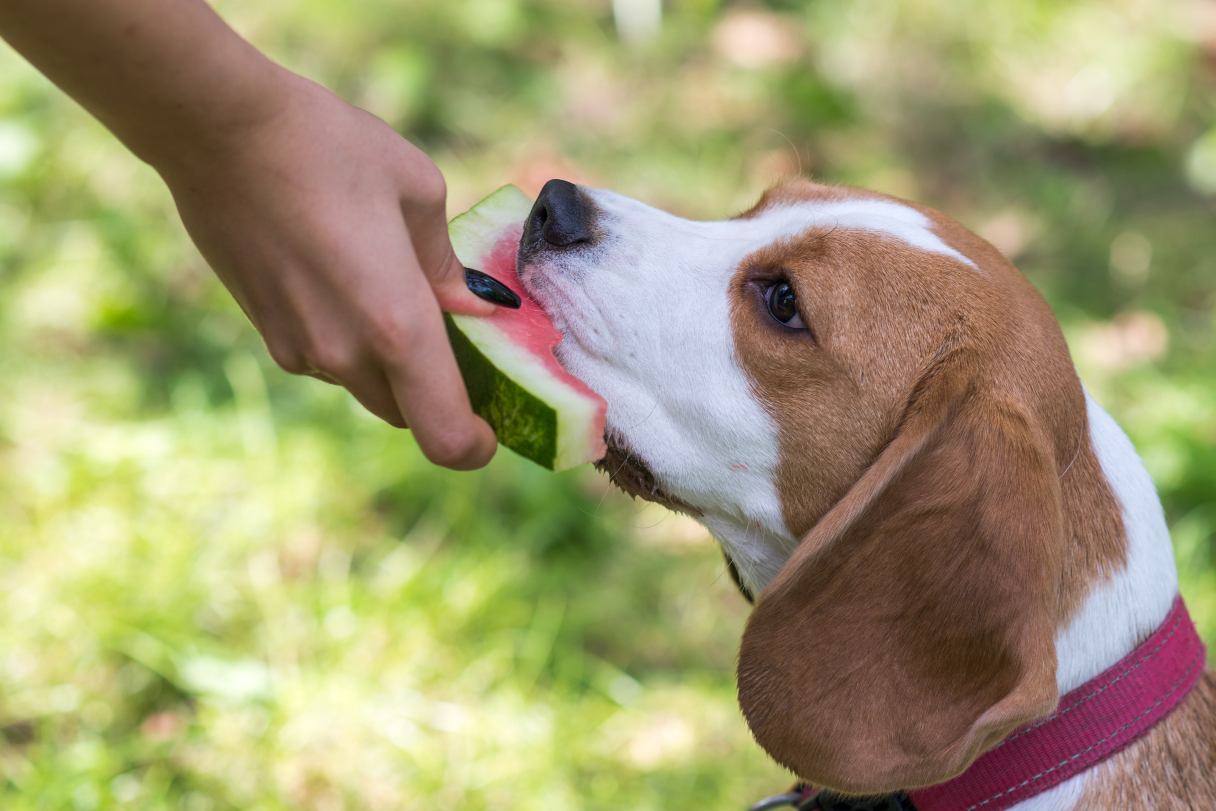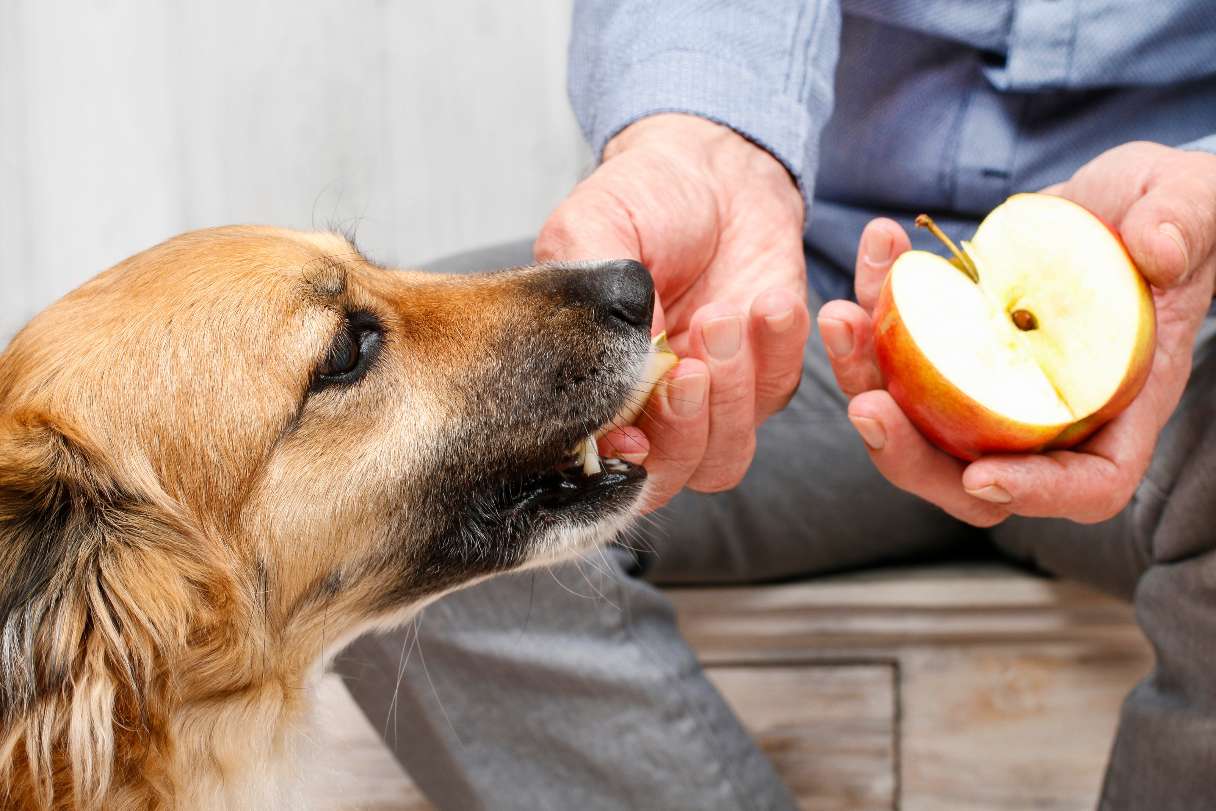There’s nothing more quintessentially summer than a slice of juicy watermelon, and it’s only natural that you’d want to share this yummy treat with your pup. We’ve got good news: Watermelon is vet-approved, as long as you remove the rind and seeds first.
Is Watermelon Good for Dogs?
Yes! With a very high water content (over 90%), watermelon is a refreshing and hydrating treat for dogs of any age. However, it is important to always remove the rind and any seeds as they are more difficult for a dog to digest.
Health benefits
Watermelons are high in amino acids, antioxidants and vitamins — and low in fat, too.
L-citrulline is an amino acid that helps with muscle soreness and improves blood flow. The fruit's luscious red color comes from lycopene, a powerful antioxidant that is good for bone health and may help regulate blood sugar. (It’s also found in red tomatoes.)
Watermelons contain vitamin C (good for the immune system), vitamin A (good for healthy vision and growth), B vitamins including thiamin, niacin and riboflavin (support the nervous system and digestive system and protect the body from disease) and many electrolytes.
Last but not least, the high water content means that watermelon can help keep your pooch hydrated.
Dental benefits
Watermelon can be very good for your dog's dental health. It can stimulate saliva production, which helps to rinse the teeth. The fruit also contains malic acid, a natural teeth whitener that can reduce stains on your dog’s teeth.
How Much Watermelon Can Dogs Eat?
If approved by your veterinarian, watermelon is a healthy treat that can make up to 10% of your dog’s daily calories. Watermelon is also considered a low-calorie food, with one cup coming in around 40 to 50 calories. This means a small dog can have a couple of small pieces, while a larger dog may enjoy a half-cup of diced watermelon.
What Happens if a Dog Eats Too Much Watermelon?
Even though watermelon is mostly composed of water, it also contains sugar and some fiber, too; so if your dog eats too much watermelon or even some of the fibrous skin, they may develop an upset stomach or diarrhea. This usually resolves itself, but contact your veterinarian if you have any questions or concerns.
Learn More
Find a Veterinarian Near You
Are Dogs Allergic to Watermelon?
Watermelons are not a common allergen for dogs, but it is recommended to offer only a small amount of the fruit to your pup the first time and monitor for reactions such as skin irritations or vomiting. If you notice anything concerning, discontinue feeding your dog watermelon and contact your veterinarian.
How to Prepare Watermelon for Dogs
First and foremost, always remove the rind (the hard green outer shell) and any seeds. Both can cause an upset stomach or an intestinal obstruction as these parts of the fruit are very difficult to digest.
A popular way to feed your dog watermelon is to cut the fruit into small, quarter-inch cubes, but other fun ways to prepare watermelon for your dog include:
-
Freezing the cubes for an extra-refreshing treat
-
Making a pup-friendly smoothie or watermelon puree (you can also put this into ice cube trays for a frozen treat!)
-
Blending watermelon with another fruit (like banana or your dog’s favorite berry)
-
Blending watermelon with plain yogurt (freeze it for a doggie “ice cream” treat)
Don't Feed a Dog Watermelon Rinds or Seeds
As mentioned above, don’t feed your pup the rind or seeds of the watermelon. Both are difficult to digest and can cause gastrointestinal issues.
CareCredit Credit Card Financing for Dogs
Taking good care of your pet's well-being from nose to tail is essential. Make sure to stay up to date on their regular checkups at the vet to help keep your pet happy and healthy for a lifetime of love. You can use your CareCredit credit card for pet care throughout the year for routine veterinary services as well as emergencies and surgeries.* Use our Acceptance Locator to find a veterinarian near you that accepts CareCredit.
CareCredit is there for you and your pet every step of the way. Continue your wellness journey by downloading the CareCredit Mobile App to manage your account, find a provider on the go and easily access the Well U blog for more great articles, podcasts and videos.
In addition to pet care, you can also use your CareCredit credit card for dentistry, cosmetic, vision, hearing, health systems, dermatology, pharmacy purchases, spa treatments and so much more within the CareCredit network. How will you invest in your health and wellness next?
Author Bio
Dr. Kathy Wiederkehr (Wentworth) has been practicing veterinary medicine at pet care facilities in California since 2001. Most recently, she served as medical director of the VCA PetPoint Medical Center and Resort in Irvine. She is a graduate of the University of Pennsylvania School of Veterinary Medicine and became board-certified as a diplomate in Canine and Feline Practice by the American Board of Veterinary Practitioners in 2010.








